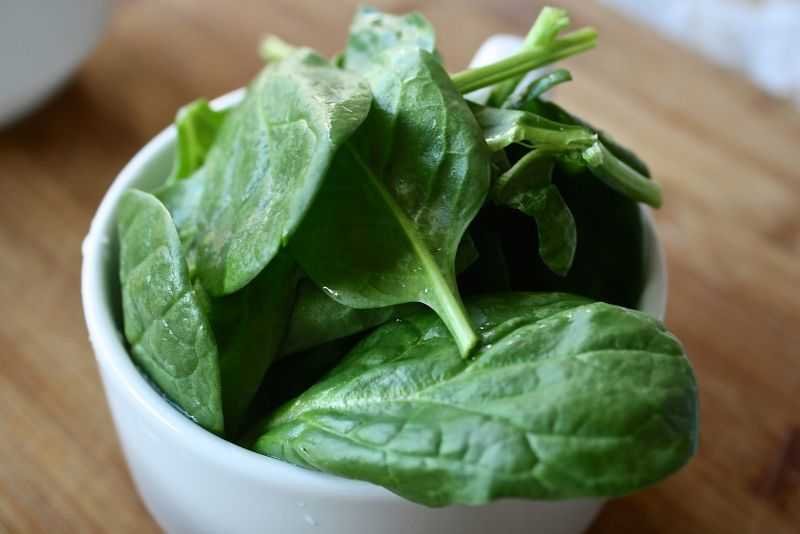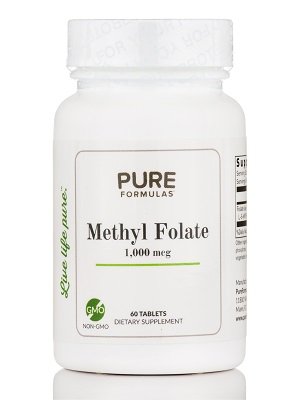Folate (Vitamin B9): Benefits, Deficiency, RDA, Foods, Absorbtion

Folate is a water-soluble B vitamin that helps keep your cells, tissues and DNA healthy. It’s especially important for women who are pregnant or could become pregnant to maintain a sufficient intake of folate-especially during the first three months of pregnancy, when it’s needed to prevent birth defects.
For most people, getting enough folate from a varied diet is usually not a problem, but some groups of people-including the elderly, alcoholics and those with certain medical conditions-are at risk for folate deficiency.
Folate supplements are available, and some foods are now fortified with folic acid (the synthetic form of folate), which can help prevent deficiencies.
In this article we are going to discuss the vitamin known as folate, also called folic acid or Vitamin B9.
What is folate
Folate is a water-soluble vitamin found in leafy green vegetables, legumes, nuts, and fortified foods. It is important for pregnant women and their developing babies, as well as people who have certain medical conditions.
Folate helps make new cells in the body, including red blood cells. It also helps break down homocysteine, a substance that can build up in the blood and lead to heart disease.
Folate is important for pregnant women because it helps prevent certain birth defects of the baby’s brain and spine. These birth defects are serious and can even be life-threatening. It is important to get enough folate from food or supplements before and during pregnancy.
People with certain medical conditions need to take folate supplements. These conditions include anemia, Crohn’s disease, ulcerative colitis, and liver disease. People with these conditions may not be able to absorb enough folate from food.
The human body is not able to synthesize folic acid, which means that its sufficiency in the body depends solely on diet or, in some cases, on the use of supplements.
Health Benefits of Folate
Cardiovascular Disease
Cardiovascular disease (CVD) is the biggest killer in the world. It is a general term for conditions that affect the heart and blood vessels, including heart attack, angina, stroke, and peripheral vascular disease. Some risk factors for CVD are well known, such as smoking and high blood pressure, but others are less so. For example, did you know that low levels of folate – one of the B vitamins – may increase your risk of CVD?
Low levels of folate have been linked with an increased risk of CVD, but it’s not clear exactly how the two are connected. One theory is that low levels of folate may lead to high levels of homocysteine in the blood. Homocysteine is an amino acid that has been linked with an increased risk of CVD.
Neural Tube Defects
Folate is a water-soluble vitamin that is important for pregnant women to take because it helps prevent birth defects of the baby’s brain and spine. These birth defects are serious and can even be life-threatening. It is important to get enough folate from food or supplements before and during pregnancy.
Cancer
Some evidence that suggests a link between low levels of folate and an increased risk of breast cancer. More specifically a review and meta-analysis published in the popular scientific publication ”Nature”, suggests that women with daily dietary folate intake between 153 and 400 μg showed a significant reduced breast cancer risk compared with those less than 153 μg.
However, more research is needed to determine if there is a definite relationship between the two.
DNA Synthesis
Folic acid is necessary for the synthesis, repair and function of DNA and RNA, the basic building blocks of life. Folic acid is mainly needed in rapidly proliferating tissues such as hematopoietic tissue, nerve tissue and fetal tissue.
Related: How To Repair Your DNA Naturally – Consume These Vitamin Packed Foods
Protein Metabolism
Folic acid in synergy with vitamin C and vitamin B12 help the body to metabolize, break down, use and synthesize new proteins.
Folic acid is therefore required for the production and maintenance of new cells and is particularly important during periods of rapid growth, such as infancy and pregnancy.
What is the Recommended Daily Allowance of folic acid?
In April 1998, the National Academy of Sciences announced new recommended daily doses of folic acid, doubling the recommended amount for all ages, men and women.
| Age Group | RDA (mg) |
|---|---|
| 14 years + | 400 mg |
| 9-13 years old | 300 mg |
| 4-8 years old | 200 mg |
| 1-3 years old | 150 mg |
| During Pregnancy | 600 mg |
| During Lactating | 500 mg |
Factors reducing folate absorption
The factors that reduce the absorption of folic acid are:
Symptoms of folic acid deficiency
Folic acid deficiency manifests itself in an insidious way.
Some non-specific symptoms are listed below and do not only occur in folic acid deficiency.
Folic acid deficiency occurs when the diet is inadequate, if there are increased requirements or if losses of folic acid are increased.
Pregnancy and breastfeeding increase the need for folic acid, and malabsorption of folic acid by the small intestine can occur in conditions such as celiac disease and Crohn’s disease. Increased loss of folate through the urine occurs with the use of diuretic tablets or in cases of alcohol abuse.
What are some of the best folate supplement brands?
There are many different brands of folate supplements. Some of the most popular ones include Rainbow Light, MegaFood, and Pure Encapsulations.
Some popular folate supplements that are suitable for pregnants as well are:
1. Rainbow Light
When it comes to prenatal vitamins, you want the best for you and your baby. Rainbow Light Prenatal One Multivitamin is clinically proven to provide high levels of absorption of key nutrients like vitamin D, B2, B5, and folate.
Plus, it’s made with non-GMO ingredients and is vegetarian-friendly. With 90 tablets per bottle, it’s a great value for a 3-month supply.
2. MegaFood
If you’re looking for a folic acid supplement that is doctor-formulated and designed to support fetal health, look no further than MegaFood.
This Folic Acid Supplement is created by Tieraona Low Dog, M.D., one of the world’s leading experts in women’s health and dietary supplementation.
Not only does this supplement include methylated folate (the active form of folic acid), but it is also easy to take – just one Capsule Daily.
3. Nature Made
Nature Made Folic Acid Supplement provides you with the daily recommended amount of folate in an easy-to-take tablet form.
The supplement comes in a convenient 250 tablet bottle, so you can easily get your recommended daily dose.
4. Nutricost
Nutricost Folic Acid Supplement provides 1000 mcg of this important nutrient in each easy-to-take capsule.
Just one Nutricost Folic Acid Supplement capsule a day can help to ensure that you are getting the recommended daily amount of folic acid. This supplement is also a great way to boost your energy levels and immune system. As an added bonus, each capsule is vegetarian and non-GMO.
5. Pure Encapsulations
Pure Encapsulations Folic Acid supplement may be right for you.
This hypoallergenic dietary supplement comes in a convenient 60-capsule size, making it easy to get the nutritional support you need. Plus, it’s from a brand you can trust – Pure Encapsulations.
Who should be taking folate supplements?
People with certain medical conditions need to take folate supplements. These conditions include anemia, Crohn’s disease, ulcerative colitis, and liver disease.
People with these conditions may not be able to absorb enough folate from food. Taking a folate supplement can help prevent or treat these conditions.
Foods that are high in folate
| Food (100g) | Folate | RDA (%) |
|---|---|---|
| Asparagus (raw) | 52.0mcg | 13% |
| Brussels sprouts (raw) | 61.0mcg | 15% |
| Spinach (raw) | 194mcg | 49% |
| Cabbage (raw) | 43.0mcg | 11% |
| Broccoli (raw) | 63.0mcg | 16% |
| Lettuce (raw) | 38.0mcg | 10% |
| Chickpeas (cooked) | 172mcg | 43% |
| Black eyed peas (cooked) | 127mcg | 32% |
| Liver, beef (cooked) | 253mcg | 63% |
| Mushrooms, shiitake (dried) | 163mcg | 41% |
| Sunflower seed butter | 237mcg | 59% |
How to get enough folate in your diet without supplements?
One of the easiest ways to get folate in your diet is by including plenty of leafy green vegetables. That’s because these types of food are some of the best sources for this vitamin, and you can easily eat them raw or steam them.
Luckily for us, our recommended daily allowance for folate intake is quite low at only 400 micrograms per day – which is a little less than ¼ pound (4 ounces) of spinach.
Read Also: Natural Anti-Aging: 2 Vegetables For a New Brain Based On Research
Folate aids with everything from bone metabolism to red blood cell formation and helps reduce DNA damage from substances we may be exposed to like tobacco smoke.
Leafy greens are also an excellent source of other nutrients like vitamins A, C, and K as well as potassium, so there are plenty of reasons to make them a regular part of your diet.
Some other good dietary sources of folate include legumes, nuts, seeds, and fortified foods like cereals and bread.
Answer this question What are the side effects of taking too much folate?

Folic acid and pregnancy
Folic acid is very important for all women of childbearing age, and the risk of neural tube defects is significantly reduced when folic acid is taken as a supplement to a healthy diet before and during the first trimester of pregnancy.
Nerve tube abnormalities lead to deformities of the spine (e.g. spina bifida), skull and brain (e.g. anencephaly).Read also. Congenital heart disease is the most common birth defects in newborns.
Also, a new American study from Columbia University reports that expectant mothers who do not take folic acid early in their pregnancy are twice as likely to give birth to children who will have a significant speech delay.
The study was conducted in Norway, where foods are not usually fortified with folic acid as they are in the US. There, researchers looked at the speech skills of about 39,000 three-year-old children.
Years earlier, their mothers had been asked if they took supplements from 4 weeks before conception to 8 weeks after. During the study, experts also took into account factors such as the mothers’ body weight, education level and marital status.
Among 1,000 children whose mothers received folic acid during pregnancy, only 4 children developed verbal delay; for those who did not receive folic acid, this number increased to 9 children per 1,000
Folic acid and coronary heart disease
Coronary heart disease is the leading cause of death in the Western industrialised world. Atherosclerotic damage caused to blood vessels due to poorly regulated blood pressure, high cholesterol and high blood glucose levels leads to an increased risk of heart attack or acute infarction.
For many patients, atheromatosis causes a deterioration in their quality of life, forcing them to live with chest pains, difficulty in walking or limiting their daily activities (work, etc.).Folic acid can reduce blood levels of homocysteine, a substance that can cause damage to blood vessels.
Read Also: New Study: Sugars are the Real Threat to Heart Health
High concentrations of this amino acid in the blood were found in populations with an increased presence of coronary artery disease. Conversely, low levels of this substance are associated with a low incidence of coronary heart disease.
The latest medical research demonstrates that folic acid supplements reduce high levels of homocysteine in the blood. However, no corresponding reduction in the incidence of coronary heart disease and stroke was observed with a reduction in blood homocysteine.
Folic acid and colorectal cancer
A typical Mediterranean diet rich in fruits, vegetables and grains that are rich in folic acid appears to protect the colon from developing neoplasia.
New research shows that taking folic acid (through food or supplements) of about 400µg/day for at least 10 years reduces the likelihood of developing colon neoplasia, although not all studies agree on this.

Folic acid vs. folate: what’s the difference?
You may have seen these two terms used interchangeably, but there is actually a difference between folic acid and folate. Folate is the natural form of vitamin B9, while folic acid is the synthetic form of vitamin B9.
While both forms of vitamin B9 are important for your health, folate is considered to be the more active form. This means that it is more easily absorbed by your body and can be more effective in preventing or treating certain conditions.
Folic acid is found in supplements and fortified foods, while folate is found in natural food sources such as leafy green vegetables, legumes, and nuts.
If you are considering taking a supplement containing folic acid or increasing your intake of fortified foods, it is important to talk to your healthcare provider first. This is because taking high doses of folic acid can actually mask a type of anemia that is caused by vitamin B12 deficiency. This can lead to serious health problems if left untreated.
In general, it is best to get your nutrients from natural food sources whenever possible. However, if you are not able to get enough folate from your diet, taking a supplement may be necessary. Be sure to talk to your healthcare provider before starting any new supplement regimen.
Final Take
So, whether you’re looking for a prenatal vitamin that includes folate or are just trying to make sure you’re getting enough of this important nutrient, there is a supplement out there for you.
Be sure to talk with your doctor before starting any new supplements, but in the meantime, try one of the great options we’ve listed above. And remember, eating plenty of leafy green vegetables is always a good way to get your daily dose of folate!





